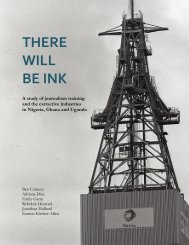Paper - Initiative for Policy Dialogue
Paper - Initiative for Policy Dialogue
Paper - Initiative for Policy Dialogue
You also want an ePaper? Increase the reach of your titles
YUMPU automatically turns print PDFs into web optimized ePapers that Google loves.
14<br />
Switzerland, a landlocked mountainous country, shows that geography is not destiny.<br />
Nor is it likely that Mongolia would have grown more rapidly if this landlocked country<br />
had had a corridor to the sea.<br />
Countries cannot, moreover, change their geography. The relevant question is, given<br />
their geography, what policies and institutions can best promote growth. Indeed, in the<br />
light of the improvement in African growth per<strong>for</strong>mance since the late 1990s, with a<br />
number of landlocked countries recording annual growth rates of some 5% or so, there is<br />
the question of the significance of the whole geography debate.<br />
The passion generated by the debate is reflected in one African participant being<br />
moved to comment that “in the 80s we were told to get our prices right; then we were told<br />
to get our policies right; then to get our institutions right; then to get our history right; and<br />
now we are being told to get our geography right but where on earth can we move Africa<br />
to” The example of Ethiopia was cited where the new, rapidly growing exports of<br />
flowers and leather goods were based around Addis Ababa rather than cities much nearer<br />
to the coast so that “geography doesn’t even work within a country”. Resource-poor,<br />
landlocked Ethiopia was attempting to emulate East Asia with some success, and its<br />
policy makers did not consider geography to be an insuperable or even all that important<br />
a barrier (Prime Minister Meles Zenawi and his Economic Adviser, Ato Newai Gebre-Ab<br />
participated in two meetings, though not in their official capacities).<br />
The position of the “geography-growth-skeptics” is more precisely interpreted as<br />
follows. Geography is, of course important: it affects the availability of natural<br />
resources, transport costs, irrigation potential, infrastructure costs, disease burden and so<br />
on. Geography is multi-dimensional and simply focusing on one or other element like<br />
being landlocked is too simplistic. Geography may well be an important explanation of<br />
why some countries are poorer than others. It may have even played a role in past<br />
growth or technical change. Indeed, there may well be some validity to the Jared<br />
Diamond view 23 that in the distant past, the East-West Axis and contiguous land mass of<br />
Eurasia facilitated trade and knowledge flows as compared with the North-South axis and<br />
physical barriers of Africa and the Americas.<br />
But so what in terms of policies and future growth potential in this age Are transport<br />
costs that important and measures to reduce them that difficult or expensive At worst,<br />
being landlocked means a somewhat higher requirement <strong>for</strong> such investments <strong>for</strong> any<br />
given growth and/or wages and land rents will be lower than they otherwise would be. It<br />
may well argue <strong>for</strong> aid donors to provide more assistance <strong>for</strong> investments in overcoming<br />
such infrastructural barriers in land-locked countries, ceteris paribus. And once these<br />
“adjustments” are made, even if levels of income are lower, why should growth be<br />
lower Indeed, if changes in technology that reduce transport costs will differentially<br />
benefit geographically disadvantaged countries, that will allow them to have growth rates<br />
that are faster than average.<br />
23 Jared Diamond (1999), Guns, Germs, and Steel: The Fates of Human Societies (W.W. Norton, New York<br />
and London)














